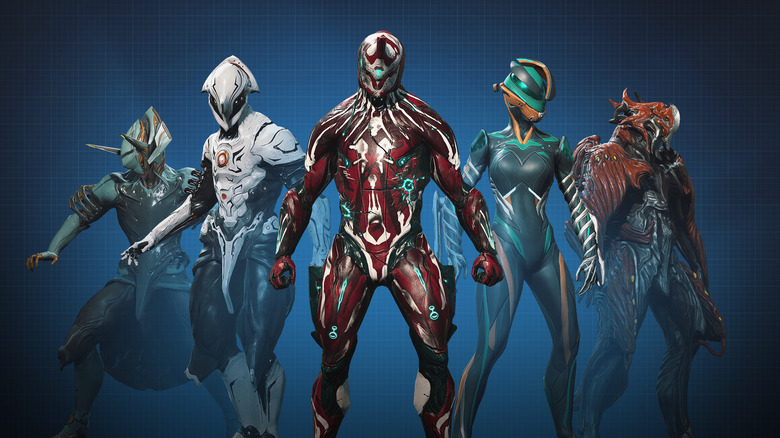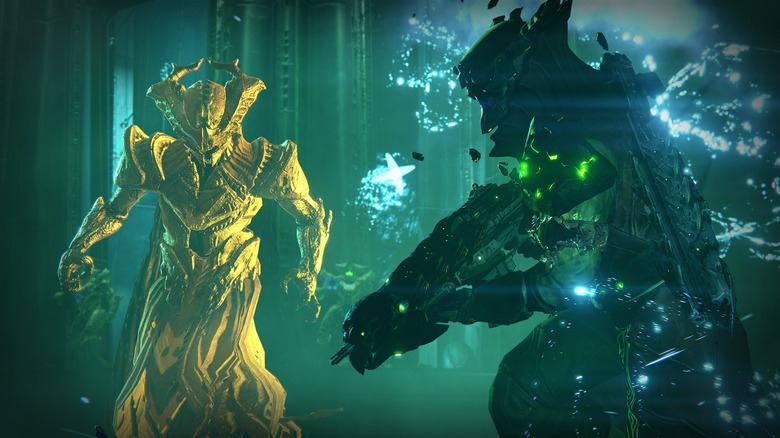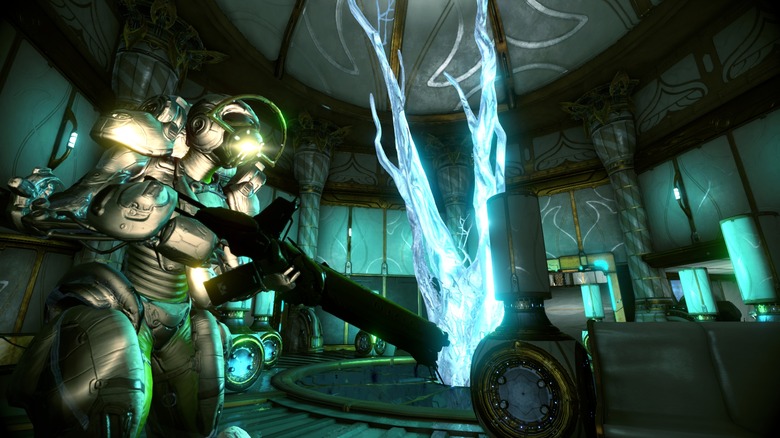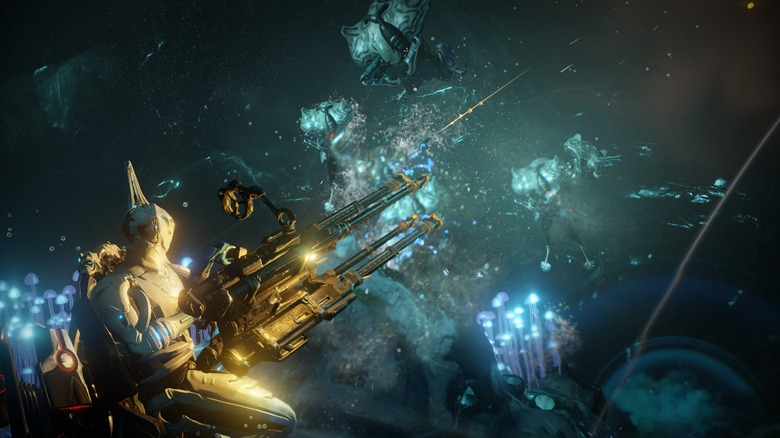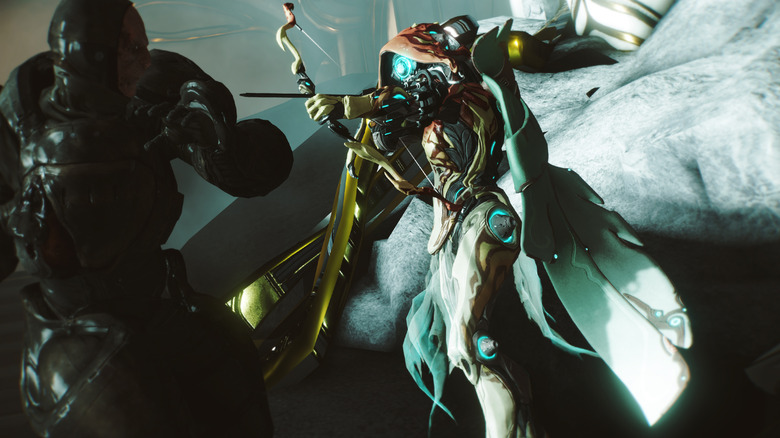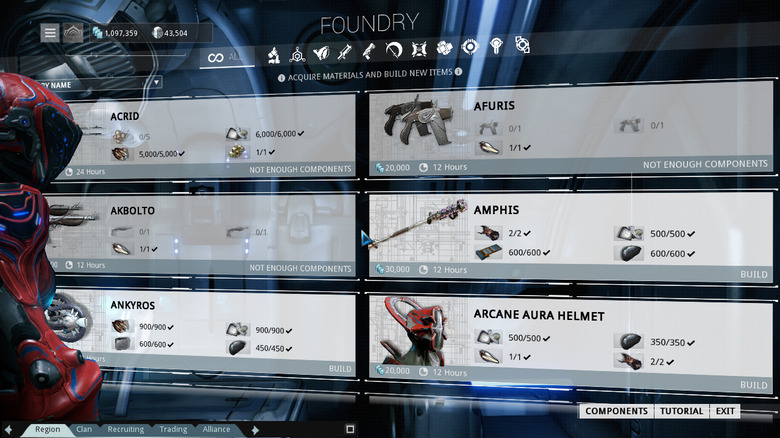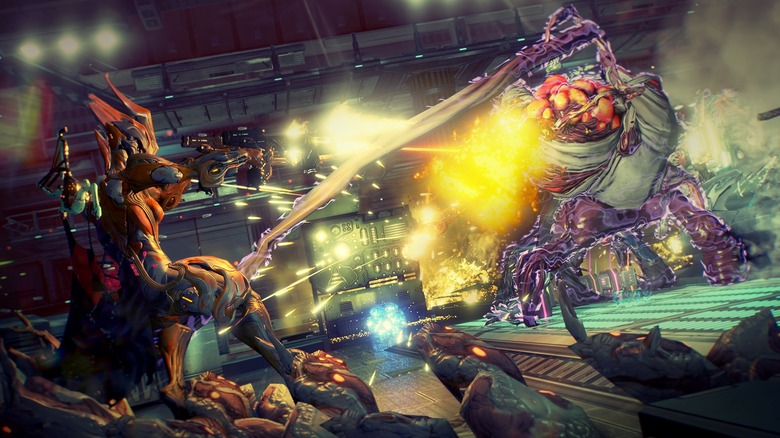Untold Truth Of Warframe
It's hard to describe the many ways Warframe has impacted video games, and the many hurdles the game had to clear to become the success it is today. It was a shared-world looter shooter before players ever loaded up Destiny for the first time. It entered the free-to-play market way before Fortnite: Battle Royale came along. And it showed that microtransactions don't have to suck. Even in a free-to-play game, where those microtransactions are the very lifeblood that keeps the servers online and the developer in business.
There's a whole lot to tell about Warframe, and about its developer, Digital Extremes. The game itself isn't tossed around with some of the big names, like Destiny or the upcoming Anthem. But Digital Extremes has been quietly plugging away, building something big. The game has a devoted fan base that continues to come back for free expansion after free expansion. And those jumping in for the very first time often find themselves overwhelmed with the amount of content to play.
It's time we take a closer look at Warframe, how it started, and how it's managed to survive and grow all these years. After reading, who knows? You might come away with an appreciation for the large-yet-somehow-still-an-underdog studio behind the title. And maybe you'll even want to jump in and check it out yourself, if you're not already a top-tier Tenno.
This is the untold truth of Warframe.
Warframe was born out of another Digital Extremes game
It may surprise some fans to know that Warframe wasn't the first game made by Digital Extremes. Not even close. The company can trace its roots back several decades, and we'll get into some of that later. But there is one interesting story from its past that is specific to Warframe. It has to do with how the game itself was conceived.
As it turns out, Warframe wasn't just dreamed up one day. It's actually the game that Digital Extremes wanted to make when it released 2008's Dark Sector. The studio just couldn't pull it off.
Dark Sector didn't exactly set the world on fire. But its failure did motivate Digital Extremes to push ahead and try to make a better version of it — the one they'd originally targeted several years earlier. Digital Extremes creative director Steve Sinclair told Gaming Bolt that, when it comes to how much Dark Sectors made its way into Warframe, it was "all of it."
Warframe, of course, is immensely more popular now than Dark Sector ever was. So if you were one of the few who played Dark Sector and thought it could be so much more, you might find Warframe better suited to your tastes.
Warframe and Destiny are constantly compared to one another
It's not all that uncommon for games in certain genres to be compared to one another. There are never-ending looks at how Call of Duty lines up against Battlefield, for instance. NBA 2K and NBA Live go at each other every single year. The Tomb Raider reboot series is compared and contrasted with the Uncharted series. It just happens that way. It can help put games into context sometimes — to understand what one does by comparing it to another.
But my goodness, you probably won't ever get to talk about Warframe without talking about Destiny, and vice versa.
The two games are so eerily similar in their aesthetic that you could look at the photo above and genuinely believe it's from Warframe. It's not. It's from Destiny. The games inhabit the same genre: shared-world looter shooter. They have the same setting: sci-fi future space. And it is your mission in both, amongst other things, to blast aliens away into dust.
The big difference between the two titles is how they monetize. Destiny is a retail game with paid expansions. Warframe is free-to-play with microtransactions.
Despite their games competing in a very similar space, the teams at Digital Extremes and Bungie are "fans of each other's work," according to Digital Extremes' Steve Sinclair. "They told me that they loved playing Warframe. I'm a big Bungie fan, so that meant a lot to me."
Early reviews of the game weren't kind
If you talk to a fan of Warframe today, you'll probably hear a lot of great things about the game. There's a huge universe to explore that spans a whole bunch of planets and locations. There are a ton of unique weapons and upgrades, giving players ways to tailor their character specifically to their play style. And something that Destiny players have longed for: Warframe players can actually walk around inside their ships, customizing various aspects as they please.
But that's the Warframe of today. The one that originally launched a few years ago was not so great.
When Warframe first released back in 2013, critics knocked the excessive grind of the game. Eurogamer stated, "There's just nothing here to make you feel like it's worth sticking around, let along start pumping money into the thing." And GameSpot took issue with the game's "pervasive tendency toward repetition."
A fair amount of that has been alleviated. Sure, there's still some grind to be done if you have no interest in pulling out your wallet. But the game's content has expanded a lot since then, which means you'll at least have some other missions and areas to explore. On top of that, Digital Extremes has stayed on top of things, and consistently looks at ways it can make the grind free-and-fair while still incentivizing players to spend money.
Warframe almost didn't happen
Here's a fact that might be a bit startling to those who love the Warframe franchise. It's one that might not be all that uncommon with game studios, especially those who keep a tight lid on things. But it's one we now know about Digital Extremes, thanks to a documentary made by former GameStop personality Danny O'Dwyer.
Warframe could've very well not been made. Why? Because Digital Extremes and Epic Games nearly merged near the turn of the millennium.
Digital Extremes and Epic Games worked together quite a bit in the late '90s and early 2000s. Digital Extremes made a few pinball titles for Epic, and even helped contribute to Epic's Unreal series. The two studios worked so closely, hand in hand, that they briefly considered merging into one mega-studio to pump out new titles.
"It was during this period that Epic and Digital Extremes almost merged," O'Dwyer says in his documentary about Warframe, "but the idea was scrapped once they realized the Canadian government would require a sizable tax payment up front."
So that was that. Digital Extremes and Epic didn't merge, after all, and the two studios moved on to find success separately. Epic Games has a string of them, including Unreal, the early Gears of War games, and now Fortnite. And Digital Extremes, of course, has Warframe.
But had they joined forces — there's a good chance Warframe would've never existed.
A Korean publisher told Digital Extremes that Warframe shouldn't go free-to-play
The story of Warframes and of Digital Extremes is really one of perseverance. It's about creating a flop, but using the good ideas from the original idea to create something better. It's about launching to not-so-favorable reviews, but working hard over the course of many years to improve the product. And it's about knowing when to trust your gut, even when the world is telling you that your plan sucks. Digital Extremes shopped Warframe around looking for a publisher before the game was even ready for launch. The studio had a working prototype, and it took that prototype to a major publisher in Korea.
That Korean publisher told Digital Extremes, "You will fail."
Digital Extremes' Steve Sinclair said the publisher was "the creator of the largest free-to-play game in the world." But the still-unnamed publisher took issue with the game's plan for monetization, believing that "Western companies can't make free-to-play because they don't update them."
So the studio pressed on. It committed to continuing work on Warframe without a publisher. And the game eventually launched in 2013 — not perfect, but without compromise.
Warframe has one of the friendliest microtransaction systems in gaming
If you say the word "microtransaction" to someone who plays video games, you're certain to get a wince, if not a curse word or two. The truth is, many current game developers and publishers don't handle microtransactions in the best way. The issue at the root of many controversies has to do with the price of games, and the fact that many feel they shouldn't be bombarded with microtransactions after already spending $60. But there are free-to-play games that don't handle microtransactions well, either, making them so core to the experience that it feels like you can't make progress without paying up.
Digital Extremes, however, has done something remarkable with Warframe. It's built a free-to-play game with one of the most friendly, ethical microtransaction systems to ever exist. And the company has been rewarded with the loyalty of its fans.
"Warframe is the game where essentially everything we have in the game that's game effecting, you can earn it," Digital Extremes' Sheldon Carter told Polygon. The game does have some of the things that players might object to, like random mod packs. The difference is, Warframe also makes it very easy to get the thing you're looking for if that's all you want. Carter notes that, "if there's a specific mod you're after you know how you can go after it" by looking in the game's codex.
Digital Extremes once removed a microtransaction because a player bought it too much
Warframe's approach to microtransactions is unique because other games don't approach them quite as ethically. If you pick up a game like Madden, for instance, the game really wants you to continue buying card packs over and over in order to get good Ultimate Team players. There's no mechanism there to ensure you get the player you want. There's no way to grind for that. You just have to buy and pray. And that's what makes the Digital Extremes take on DLC so refreshing.
The company doesn't want you to play a virtual slot machine for a chance at the one thing you want.
Nowhere is that approach more apparent than in the way Digital Extremes actually removed a microtransaction from Warframe because someone bought it too much. The item in question was essentially a mod that allowed you to customize the skin of your Kubrow, a pet in the game. A player wanted a certain pattern, and resigned to purchasing a random skin generator over and over. The player bought it over 200 times in total.
Once Digital Extremes saw that they'd accidentally "created a slot machine," they quickly patched it out, despite the potential revenue it could generate. Doing right by their players was more important.
Many of the voice actors in Warframe are Digital Extremes employees
Digital Extremes has a few hundred employees. So the studio isn't the size of say, a Bungie, which reportedly had over 700 in 2016. But the folks behind Warframe seem to do the work of a studio three times the size. How is Digital Extremes so responsive to fan requests and criticisms? How does the studio manage to issue next-day patches for problems that pop up in the game?
The answer, as it turns out, is that the employees at Digital Extremes can wear many hats.
There may be no better story about how versatile the people at Digital Extremes are than in the voice work for the game. The studio plugs away at small content drops and expansions, and seems to ship them out at amazing speeds. A big part of that has to do with the fact that many Digital Extremes employees also double as voice actors. According to PC Gamer, "Digital Extremes has an in-house sound studio and its own motion capture room, and many of the voice actors are employees at the company, allowing the team to record VO as late as the day before it's being put into the game."
So the next time you hear a character speak in Warframe, imagine this: that employee might've just finished writing the script, too.

